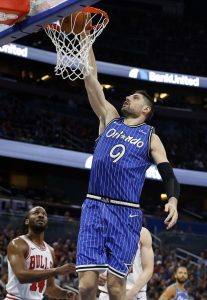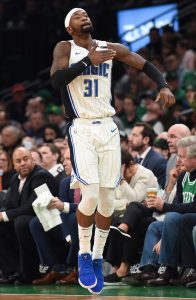After winning no more than 35 games for six consecutive seasons as they found themselves mired in an endless rebuild, the Magic took some major steps forward in 2018/19, claiming the No. 7 seed in the Eastern Conference and returning to the playoffs for the first time since the Stan Van Gundy era.
While the Jeff Weltman/John Hammond duo in the front office appears to have the team on the right track, Orlando will find itself in a tough situation this summer, as two of its more important veteran contributors are eligible for unrestricted free agency.
Here are five key questions facing the franchise this summer:
1. Will the Magic re-sign Nikola Vucevic?
Heading into the 2018/19 season, it appeared that Vucevic’s days in Orlando were numbered. After all, over the course of the previous two offseasons, the club had drafted Jonathan Isaac and Mohamed Bamba, and locked up Aaron Gordon to a lucrative new four-year contract. With Vucevic’s contract set to expire in 2019, he looked like a prime trade candidate.
The 2019 trade deadline came and went without a Vucevic deal though, and the veteran center’s All-Star performance helped the Magic reach the playoffs, as he averaged 20.8 PPG, 12.0 RPG, and 3.8 APG on .518/.364/.789 shooting. Now that he’s coming off a career year, the equation no longer looks so simple for Vucevic and the Magic.
Orlando holds the 28-year-old’s Bird rights and shouldn’t face luxury tax concerns if he’s re-signed. If they let him walk for nothing, the Magic would forfeit an asset without gaining any real cap room in 2019 to add a comparable replacement. And if Vucevic returns, it’s not like he couldn’t eventually be traded down the road. Those are all points in favor of bringing him back.
On the other hand, Weltman and Hammond brought in Isaac and Bamba themselves, with Gordon and Vucevic having been acquired by the previous regime. It would be unorthodox for a new management group to re-sign two incumbent veterans to big-money, long-term contracts in consecutive offseasons when those two vets play the same positions as their two top-six draft picks. Plus, Vucevic will require a significant investment — the Kings are among the other teams said to have interest, and they’re equipped to make a substantial offer.
The Magic’s decision on Vucevic will be a fascinating one. I don’t have a good sense yet of which way they’re leaning, but I’d be a little surprised if they invest major money in the veteran center without lining up a trade involving another one of their big men.
2. Aaron Gordon: Long-term keeper or trade chip?
If the Magic do trade one of their bigs, Gordon seems like the most obvious candidate of the bunch. Isaac and Bamba are still on rookie contracts and have plenty of room to improve, and Vucevic would be on a new contract if he’s re-signed, ineligible to be moved until at least December.
Gordon’s contract is also trade-friendly, as it declines in value each season. While he’ll earn $19.86MM in 2019/20, his cap hit will shrink to $16.4MM by the final year of his deal in 2021/22.
Still, trading Gordon would be a risk. The Magic had trouble getting points on the board last season, and Isaac and Bamba are defense-first players, while Vucevic isn’t the type of player who can break down an opposing defense.
Although Gordon is hardly the NBA’s most dynamic scorer, he took on more of a play-making role for Orlando last season and especially in the playoffs. He looked like the team’s most dangerous offensive threat in five first-round games against Toronto, averaging a club-high 15.2 PPG and nearly leading the team in assists as well (3.6 APG). He’s a versatile two-way player who has improved every season.
If Gordon is dealt this summer, he should be used in a deal that lands the Magic a strong offensive player who can get his own shot and set up his teammates, whether that’s a point guard, a wing, or a forward. If Orlando can’t get a clear upgrade in that area, it probably makes more sense to hang onto Gordon for the time being to see if he can continue to expand that aspect of his game.
3. How much confidence do the Magic have in Markelle Fultz?
The Magic do have one player on the roster who meets the play-maker criteria I mentioned above, but that player has yet to appear in a game for the team. The No. 1 pick in the 2017 draft, Fultz was sent to Orlando in a deadline deal in February, but was sidelined for the rest of the season as he continued to recover from thoracic outlet syndrome.
The club’s level of confidence in Fultz will have a significant impact on multiple aspects of the offseason. For one, a decision on the youngster’s 2020/21 team option is due by October 31. The Magic will have a chance to see Fultz in training camp and the preseason, and hopefully in some regular-season action before they have to make a call on that option, and they’ll want to make sure they don’t jump the gun on that decision — because he was the first overall pick, the fourth-year option on Fultz’s rookie contract will be worth an eye-popping $12.29MM.
Before making that call, the Magic will have to decide this summer how seriously to focus on upgrading the point guard position. D.J. Augustin did well as the starter last season, but his upside is limited, and he’ll be entering the final year of his contract in 2019/20. If Fultz is expected to be healthy and the Magic still strongly believe in his potential, he and Augustin could be relied upon to handle point guard duties.
But given how weak the Magic’s point guard play was behind Augustin last season, the team may not want to put that much pressure on Fultz. While the Magic probably won’t have cap room available, they could use their mid-level exception on a veteran free agent point guard. That would give them a reliable insurance policy at the position, and if Fultz bounces back, they’d be fine using lineups featuring two point guards, given Fultz’s size and Augustin’s outside shooting ability.
4. Will the Magic re-sign Terrence Ross?
 Vucevic is probably the most important free agent on the Magic’s books this offseason, but Ross isn’t far behind. On a roster that didn’t feature many other efficient volume shooters, he played a crucial role, making 38.3% of his three-point attempts on a career-high 7.0 attempts per game. He’s not a one-dimensional player either, as he contributed to one of the NBA’s best defenses with his length and versatility.
Vucevic is probably the most important free agent on the Magic’s books this offseason, but Ross isn’t far behind. On a roster that didn’t feature many other efficient volume shooters, he played a crucial role, making 38.3% of his three-point attempts on a career-high 7.0 attempts per game. He’s not a one-dimensional player either, as he contributed to one of the NBA’s best defenses with his length and versatility.
As is the case with Vucevic, the Magic hold Ross’ Bird rights, so there will be no cap restrictions stopping them from bringing him back. It’ll simply be a matter of how much they’re willing to pay, and how much competition they get from rival teams — Ross’ outside shooting will make him popular on the open market, and he’ll be unrestricted.
While the Magic shouldn’t offer anything crazy to re-sign Ross, it wouldn’t shock me if the team pushes harder to retain him than Vucevic, considering the center will likely be more expensive. Even though his arrival predates the Weltman/Hammond era in Orlando, it’s not as if the management group doesn’t like him — Ross played for the Raptors for several years when Weltman was in Toronto’s front office.
Given their ability to offer him more than the mid-level, the Magic may try to get something done with Ross early in free agency, while clubs with cap room are still focused on bigger targets.
5. Will the Magic try to trade Evan Fournier or Timofey Mozgov?
As I previously noted, the Magic aren’t likely to have cap room available this summer, unless the team loses both Vucevic and Ross. Fournier’s and Mozgov’s contracts are contributing to Orlando’s lack of cap flexibility — the former is on the books for $17MM in 2019/20, while the latter has a $16.72MM cap charge.
Mozgov has bounced around among multiple teams since the Lakers signed him in 2016 to a four-year, $64MM contract that was considered an overpay from day one. He could change homes again this season if the Magic make a major trade — with his deal finally set to expire at the end of the 2019/20 season, he’d make a good salary-matching piece for a club looking to open up cap room in 2020.
If no trade opportunities materialize for the Magic, they should be content to keep Mozgov on their books, perhaps buying him out at some point without stretching his salary. Unless they make other cost-cutting moves, stretching Mozgov and spreading his remaining cap hit across three seasons probably wouldn’t give Orlando many more options this offseason, and it would compromise the club’s flexibility in future years.
A Fournier deal may actually be more realistic. His name has come up repeatedly in trade rumors since Weltman and Hammond arrived in Orlando, and with just two years remaining on his lengthy deal, he’s more movable now than he has been in the past.
Of course, he’s also coming off a down year by his standards, so Fournier won’t have a ton of value on the trade market, and the Magic won’t want to attach a valuable asset to move him. Still, given all the trade speculation that has surrounded him in the past, I’d be surprised if the club doesn’t explore its options with Fournier again this summer.
Check out the Orlando Magic’s offseason salary cap outlook right here.
Salary information from Basketball Insiders was used in the creation of this post. Photos courtesy of USA Today Sports Images.
Let Vuc go, play Bamba and sign D-Lo if the Nets gets Kyrie. Orlando needs backcourt talent BAD. Forget about Fultz, unless he develops some sudden inner strength, he may never recover physically/mentally. Isaac, Bamba & DLo plus whoever you pick at the midround (some outside scorer like Kevin Porter Jr or Langford if you’re lucky) and you have a good foundation for the future. Gordon could stay or go, doesn’t really matter right now, Orlando has to play the long game.
A team of teases.
#16, Isaac, Mozgov for K Love
Doom + Gloom = Orlando :( Many RIP